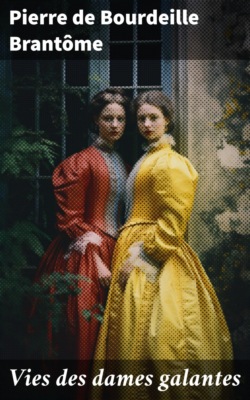Читать книгу: «The book of the ladies», страница 19
The same thing happened when her Highness came to the coronation of the late King Charles IX. at Reims, to which she was invited. When she arrived, she would not enter the town on horseback, fearing she could not thus show her grandeur and high estate; but she put herself into a most superb carriage, entirely covered with black velvet, on account of her widowhood, which was drawn by four Turk horses, the finest that could be chosen, and harnessed all four abreast after the manner of a triumphal car. She sat by the door, very well dressed, but all in black, in a gown of velvet; but her head was white and very handsomely and superbly coiffed and adorned. At the other door of her carriage was one of her daughters, afterwards Mme. la Duchesse de Bavière, and within was the Princesse de Macédoine, her lady of honour.
The queen-mother, wishing to see her enter the courtyard in this triumphal manner, placed herself at a window and said, quite low, “There’s a proud woman!” Then her Highness having descended from her carriage and come upstairs, the queen advanced to receive her at the middle of the room, not a step beyond, and rather nearer the door than farther from it. There she received her very well; because at that time she governed everything, King Charles being so young; and did all she wished, which was certainly a great honour to her Highness. All the Court, from the highest to the lowest, esteemed and admired her much and thought her very handsome, although she was declining in years, being at that time rather more than forty; but nothing as yet showed it, her autumn surpassing the summer of others.
She died one year after hearing the news that she was Queen of Denmark, from which she came, and that the kingdom had fallen to her; so that before her death she was able to change the title of Highness, she had borne so long, to that of Majesty. And yet, for all that, as I have heard, she was resolved not to go to her kingdom, but to end her days in her dower-house at Tortonia in Italy, where the countryside called her only Madame de Tortonia; she having retired there some time before her death, as much because of certain vows she had made to the saints of those parts as to be near the baths of Tortonia, she being feeble in health and very gouty.
Her practices were fine, saintly, and honourable, to wit: praying God, giving alms, and doing great charity to the poor, above all to widows. This is a summary of what I have heard of this great princess, who, though a widow and very beautiful, conducted herself virtuously. It is true that one might say she was married twice: first with Duc Sforza, but he died at once; they did not live a year together before she was a widow at fifteen. Then her uncle, the Emperor Charles V., remarried her to the Duc de Lorraine, to strengthen his alliance with him; but there again she was a widow in the flower of her age, having enjoyed that fine marriage but a very few years; and those that remained to her, which were her finest and most precious in usefulness, she kept and consumed in a chaste widowhood.
7. Marie d’Autriche, wife of the Emperor Maximilian II
This empress, though she was left a widow quite young and very beautiful, would never marry again, but contained herself and continued in widowhood very virtuously, having left Austria and Germany, the scene of her empire, after the death of her husband. She returned to her brother, Philip II. in Spain; he having sent for her, and begged her to come and assist him with the heavy burden of his affairs, which she did; being a very wise and judicious princess. I have heard the late King Henri III. say, – and he was a better judge of people than any man in his kingdom, – that to his mind she was one of the ablest and most honourable princesses in the world.
On her way to Spain, after crossing the Germanys, she came to Italy and Genoa, where she embarked; and as it was winter and the month of December when she set sail, bad weather overtook her near Marseille, where she was forced to put in and anchor. But still, for all that, she would not enter the port, neither her own galley nor the others, for fear of causing suspicion or offence. Only once did she enter the town, just to see it. She remained there eight days awaiting fair weather. Her best exercise was in the mornings, when she left her galley (where she slept) and went to hear mass and service at the church of Saint-Victor, with very ardent devotion. Then her dinner was brought and prepared in the abbey, where she dined; and after dinner she talked with her women or with certain gentlemen from Marseille, who paid her all the honour and reverence that were due to so great a princess; for King Henri had commanded them to receive her as they would himself, in return for the good greeting and cheer she had given him in Vienna. So soon as she perceived this she showed herself most friendly, and spoke to them very freely both in German and in French; so that they were well content with her and she with them, selecting twenty especially; among them M. Castellan, called the Seigneur Altivity, captain of the galleys, who was distinguished for having married the beautiful Châteauneuf at Court, and also for having killed the Grand-prior, as I shall relate elsewhere.
It was his wife who told me all that I now relate, and discoursed to me about the perfections of this great princess; and how she admired Marseille, thinking it very fine, and went about with her on her promenades. At night she returned to her galley, so that if the fine weather and the good wind came, she might quickly set sail. I was at our Court when news was brought to the king of this passing visit; and I saw him very uneasy lest she should not be received as she ought to be, and as he wished. This princess still lives, and continues in all her fine virtues. She greatly helped and served her brother, as I have been told. Since then she has retired to a convent of women called the “bare-footed” [Carmelites], because they wear neither shoes nor stockings. Her sister, the Princess of Spain, founded them.
8. Blanche de Montferrat, Duchesse de Savoie
While I am on this subject of noble widows I must say two words of one of past times, namely: that honourable widow, Madame Blanche de Montferrat, one of the most ancient houses in Italy, who was Duchesse de Savoie and thought to be the handsomest and most perfect princess of her time; also very virtuous and judicious, for she governed wisely the minority of her son and his estates; she being left a widow at the age of twenty-three.
It was she who received so honourably our young King Charles VIII. when he went to his kingdom of Naples, through all her lands and principally her city of Turin, where she gave him a pompous entry, and met him in person, very sumptuously accoutred. She showed she felt herself a great lady; for she appeared that day in magnificent state, dressed in a grand gown of crinkled cloth of gold, edged with large diamonds, rubies, sapphires, emeralds, and other precious stones. Round her throat she wore a necklace of very large oriental pearls, the value of which none could estimate, with bracelets of the same. She was mounted on a beautiful white ambling mare, harnessed most superbly and led by six lacqueys dressed in figured cloth of gold. A great band of damoiselles followed her, very richly, daintily, and neatly dressed in the Piedmont fashion, which was fine to see; and after them came a very long troop of noblemen and knights of the country. Then there entered and marched King Charles, beneath a rich canopy, and went to the castle, where he lodged, and where Madame de Savoie presented to him her son, who was very young. After which she made the king a fine harangue, offering her lands and means, both hers and her son’s; which the king received with very good heart, and thanked her much, feeling greatly obliged to her. Throughout the town were everywhere seen the arms of France and those of Savoie interlaced in a great lover’s-knot, which bound together the two escutcheons and the two orders, with these words: Sanguinis arctus amor; as may be read in the “Chronicles of Savoie.”
I have heard several of our fathers and mothers, who got it from their parents, and also Mademoiselle the Sénéchale de Poitou, my grandmother, then a damoiselle at Court, affirm that nothing was talked of but the beauty, wisdom, and wit of this princess, when the courtiers and gallants returned from their journey; and, above all, by the king, who seemed, from appearance, to be wounded in his heart.
At any rate, even without her beauty, he had good reason to love her; for she aided him with all the means in her power, and gave up her jewels and pearls and precious stones to send them to him that he might use them and pledge them as he pleased; which was indeed a very great obligation, for ladies bear a great affection to their precious stones and rings and jewels, and would sooner give and pledge some precious piece of their person than their wealth of jewels – I speak of some, not all. Certainly this obligation was great; for without this courtesy, and that also of the Marquise de Montferrat, a very virtuous lady and very handsome, he would have met in the long run a short shame, and must have returned from the semi-journey he had undertaken without money; having done worse than that bishop of France who went to the Council of Trent without money and without Latin. What an embarkation without biscuit! However, there is a difference between the two; for what one did was out of noble generosity and fine ambition, which closed his eyes to all inconveniency, thinking nothing impossible to his brave heart; while as for the other, he lacked wit and ability, sinning in that through ignorance and stupidity – if it was not that he trusted to beg them when he got there.
In this discourse that I have made of that fine entry, there is to be noted the superbness of the accoutrements of this princess, which seem to be more those of a married woman than a widow. Upon which the ladies said that for so great a king she could dispense with mourning; and also that great people, men and women, gave the law to themselves; and besides, that in those times the widows, so it was said, were not so restricted nor so reformed in their clothes as they have been since for the last forty years; like a certain lady whom I know, who, being in the good graces and delights of a king [probably Diane de Poitiers] dressed herself much à la modest (though always in silk), the better to cover and hide her game; and in that respect, the widows of the Court, wishing to imitate her, did the same. But this lady did not reform herself so much, nor to such austerity, that she ceased to dress prettily and pompously, though always in black and white; indeed there seemed more of worldliness than of widow’s reformation about it; for especially did she always show her beautiful bosom. I have heard the queen, mother of King Henri, say the same thing at the coronation and wedding of King Henri III., namely: that the widows in times past did not have such great regard to their clothes and to modesty of actions as they have to-day; the which she said she saw in the times of King François, who wanted his Court to be free in every way; and even the widows danced, and the partners took them as readily as if they were girls or married women. She said on this point that she commanded and begged M. de Vaudemont to honour the fête by taking out Madame la Princesse de Condé, the dowager, to dance; which he did to obey her; and he took the princess to the grand ball; those who were at the coronation, like myself, saw it, and remember it well. These were the liberties that widows had in the olden time. To-day such things are forbidden them like sacrilege; and as for colours, they dare not wear them, or dress in anything but black and white; though their skirts and petticoats and also their stockings they may wear of a tan-gray, violet, or blue. Some that I see emancipate themselves in flesh-coloured red and chamois colour, as in times past, when, as I have heard said, all colours could be worn in petticoats and stockings, but not in gowns.
So this duchess, about whom we have been speaking, could very well wear this gown of cloth of gold, that being her ducal garment and her robe of grandeur, the which was becoming and permissible in her to show her sovereignty and dignity of duchess. Our widows of to-day dare not wear precious stones, except on their fingers, on some mirrors, on some “Hours,” and on their belts; but never on their heads or bodies, unless a few pearls on their neck and arms. But I swear to you I have seen widows as dainty as could be in their black and white gowns, who attracted quite as many and as much as the bedizened brides and maidens of France. There is enough said now of this foreign widow.
9. Catherine de Clèves, wife of Henri I. de Lorraine, Duc de Guise
Madame de Guise, Catherine de Clèves, one of the three daughters of Nevers (three princesses who cannot be lauded enough either for their beauty or their virtues, and of whom I hope to make a chapter), has celebrated and celebrates daily the eternal absence of her husband [Le Balafré, killed at Blois 1588]. But oh! what a husband he was! The none-such of the world! That is what she called him in several letters which she wrote to certain ladies of her intimacy whom she held in esteem, after her misfortune; manifesting in sad and grievous words the regrets of her wounded soul.
10. Madame de Bourdeille
Madame de Bourdeille, issuing from the illustrious and ancient house of Montbéron, and from the Comtes de Périgord and the Vicomtes d’Aunay, became a widow at the age of thirty-seven or thirty-eight, very beautiful (in Guyenne, where she lived, it was believed that none surpassed her in her day for beauty, grace, and noble appearance); and being thus in fine estate and widowed, she was sought in marriage and pursued by three very great and rich seigneurs, to whom she answered: —
“I shall not say as many ladies do, who declare they will never marry, and give their word in such a way that they must be believed, after which nothing comes of it; but I do say that, if God and flesh do not give me any other wishes than I have at present, it is a very certain thing that I have bade farewell to marriage forever.”
And then, as some one said to her, “But, madame, would you burn of love in the flower of your age?” she answered: “I know not what you mean. For up to this hour I have never been even warmed, but widowed and cold as ice. Still, I do not say that, being in company with a second husband and approaching his fire, I might not burn, as you think. But because cold is easier to bear than heat, I am resolved to remain in my present quality and to abstain from a second marriage.”
And just as she said then, so she has remained to the present day, a widow these twelve years, without the least losing her beauty, but always nourishing it and taking care of it, so that it has not a single spot. Which is a great respect to the ashes of her husband, and a proof that she loved him well; also an injunction on her children to honour her always. The late M. Strozzi was one of those who courted her and asked her in marriage; but great as he was and allied to the queen-mother, she refused him and excused herself kindly. But what a humour was this! to be beautiful, virtuous, a very rich heiress, and yet to end her days on a solitary feather-bed and blanket, desolate and cold as ice, and thus to pass so many widowed nights! Oh! how many there be unlike this lady – but some are like her, too.
APPENDIX
I
(See page 30.)
UNDER Louis XII. the French fleet and the English fleet met, August 10, 1513, off the heights of Saint-Maché, in Lower Bretagne. The English fleet, eighty vessels strong, attacked that of France, which had but twenty. The French made up for numbers by courage and ability. They seized the advantage of the wind, fouled the enemy’s ships and shattered them, and sent more than half to the bottom. The Breton Primauguet was captain of “La Cordelière;” the vessel constructed after the orders of Queen Anne; it could carry twelve hundred soldiers besides the crew. He was attacked by twelve English vessels, defended himself with a courage that amounted to fury, sunk a number of the enemy’s vessels, and drove off the rest. One captain alone dared approach him again, flinging rockets on board of him, and so setting fire to the vessel. Primauguet might have saved himself in the long-boat, as did some of the officers and soldiers; but that valiant sailor would not survive the loss of his ship; he only thought of selling his life dearly and taking from the English the pleasure of enjoying the defeat of the French. Though all a-fire, he sailed upon the flag-ship of the enemy, the “Regent of England,” grappled her, set fire to her, and blew up with her an instant later. More than three thousand men perished in this action by cannon, fire, and water. It is one of the most glorious pages in our maritime annals.
French editor of “Vie des Dames Illustres,”Garnier-Frères. Paris.
II
(See page 44.)
This is doubtless the Discours merveilleux de la vie, actions, et déportemens de la reine Catherine de Médicis, attributed to Théodore de Bèze, also to de Serres, but with more probability to Henri Étienne; coming certainly from the hand of a master. It was printed and spread about publicly in 1574 with the date of 1575; inserted soon after in the Mémoires d’État sous Charles IX., printed in 1577 in three volumes, 8vo, and subsequently in the various editions of the Reccuil de diverses pièces pour servir à l’histoire du règne de Henri III.
French editor.
III
(See page 91.)
M. de Maison-Fleur was a gentleman of the Bordeaux region, a Huguenot, and a somewhat celebrated poet in his day, whose principal work, Les Divins Cantiques, was printed for the first time at Antwerp in 1580, and several times reprinted in succeeding years. For details on this poet, see the Bibliothèque Française of the Abbé Goujet.
French editor.
IV
(See page 92.)
We see, ’neath white attire,
In mourning great and sadness,
Passing, with many a charm
Of beauty, this fair goddess,
Holding the shaft in hand
Of her son, heartless.
And Love, without his frontlet,
Fluttering round her,
Hiding his bandaged eyes
With veil of mourning
On which these words are writ:
Die or be captured.
V
(See page 94.)
Translation as nearly literal as possible
In my sad, sweet song,
In tones most lamentable
I cast my cutting grief
Of loss incomparable;
And in poignant sighs
I pass my best of years.
Was ever such an ill
Of hard destiny,
Or so sad a sorrow
Of a happy lady,
That my heart and eye
Should gaze on bier and coffin?
That I, in my sweet springtide,
In the flower of youth,
All these pains should feel
Of excessive sadness,
With naught to give me pleasure
Except regret and yearning?
That which to me was pleasant
Now is hard and painful;
The brightest light of day
Is darkness black and dismal;
Nothing is now delight
In that of me required.
I have, in heart and eye,
A portrait and an image
That mark my mourning life
And my pale visage
With violet tones that are
The tint of grieving lovers.
For my restless sorrow
I can rest nowhere;
Why should I change in place
Since sorrow will not efface?
My worst and yet my best
Are in the loneliest places.
When in some still sojourn
In forest or in field,
Be it by dawn of day,
Or in the vesper hour,
Unceasing feels my heart
Regret for one departed.
If sometimes toward the skies
My glance uplifts itself,
The gentle iris of his eyes
I see in clouds; or else
I see it in the water,
As in a grave.
If I lie at rest
Slumbering on my couch,
I hear him speak to me,
I feel his touch;
In labour, in repose,
He is ever near me.
I see no other object,
Though beauteous it may be
In many a subject,
To which my heart consents,
Since its perfection lacks
In this affection.
End here, my song,
Thy sad complaint,
Of which be this the burden:
True love, not feigned,
Because of separation
Shall have no diminution.
Покупайте книги и получайте бонусы в Литрес, Читай-городе и Буквоеде.
Участвовать в бонусной программе













